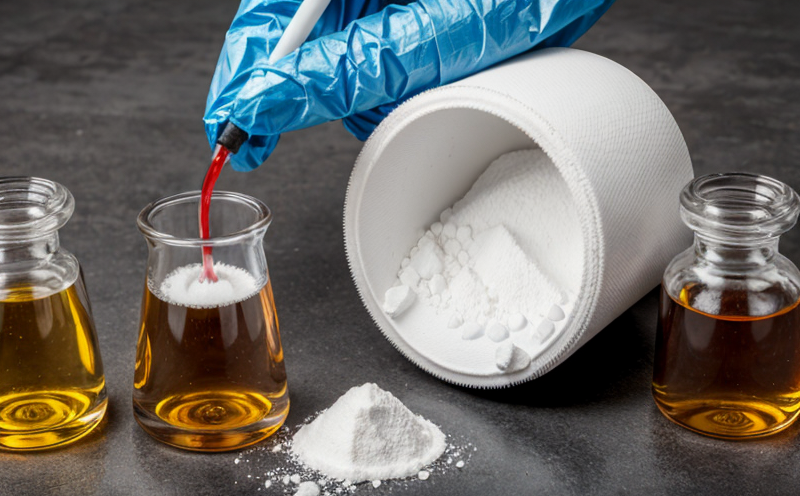IEEE 1680 Environmental Assessment and Materials Compliance Testing
The IEEE Standard 1680 is a comprehensive guide that provides methodologies to assess the environmental impact of electronic materials used in the manufacturing and design phases. This standard ensures that manufacturers can make informed decisions about material selection, thereby reducing harmful effects on the environment during the product lifecycle.
Our laboratory specializes in providing rigorous IEEE 1680 Environmental Assessments and Materials Compliance Testing services tailored to meet the needs of quality managers, compliance officers, R&D engineers, and procurement professionals. The process involves evaluating environmental impacts from material sourcing through end-of-life disposal, ensuring that all electronic products comply with stringent international standards.
The assessment covers a wide range of parameters including but not limited to biodegradability, energy efficiency, recyclability, and chemical content. By conducting these assessments, we help clients understand the full lifecycle implications of their material choices, promoting sustainability practices across industries.
Our laboratory adheres strictly to ISO 14001:2015 standards for environmental management systems ensuring that our methodologies are both robust and reliable. Our team comprises experts who have extensive experience in analyzing complex datasets generated during the testing process. This expertise ensures accurate interpretation of results leading to actionable insights.
Accurate data collection is crucial when performing IEEE 1680 assessments; therefore, we use state-of-the-art analytical techniques such as Fourier Transform Infrared Spectroscopy (FTIR), X-ray Fluorescence Spectrometry (XRF), and Inductively Coupled Plasma Mass Spectrometry (ICP-MS). These tools allow us to analyze samples comprehensively while maintaining high precision levels.
Compliance with IEEE 1680 standards not only enhances corporate responsibility but also opens up new market opportunities by demonstrating commitment to sustainability principles. Many consumers today prioritize purchasing products that have been independently verified as environmentally responsible, making compliance an essential aspect of business strategy.
In conclusion, our IEEE 1680 Environmental Assessments and Materials Compliance Testing services offer unparalleled depth and breadth in addressing environmental concerns associated with electronic materials. With a focus on sustainability and innovation, we strive to provide actionable recommendations that contribute positively towards greener manufacturing practices.
Why It Matters
The significance of conducting IEEE 1680 Environmental Assessments cannot be overstated in today’s world where environmental consciousness is at the forefront of corporate strategy. As electronic devices become increasingly prevalent, so does their contribution to global waste streams and resource depletion.
By implementing rigorous assessments based on IEEE 1680 guidelines, organizations can mitigate these adverse impacts significantly. For instance, understanding the lifecycle implications of materials helps in designing products that are easier to recycle or reuse at end-of-life stage, reducing landfill burden substantially.
Moreover, compliance with IEEE 1680 aligns companies with regulatory requirements and promotes transparency regarding environmental practices. This alignment fosters trust among stakeholders including customers who increasingly demand eco-friendly options when making purchasing decisions.
The assessment also aids in identifying potential hazards early on during development stages which can lead to cost savings by avoiding costly recalls or modifications later down the line. Furthermore, it encourages innovation within R&D teams pushing boundaries further towards more sustainable solutions.
In summary, IEEE 1680 Environmental Assessments play a critical role in driving sustainable practices within electronics manufacturing. They provide valuable insights into material selection processes that balance performance requirements with environmental responsibility.
Scope and Methodology
| Parameter | Description |
|---|---|
| Material Identification | This involves identifying the chemical composition of different materials used in electronic components. Techniques such as FTIR, XRF, and ICP-MS are employed to ensure accuracy. |
| Lifecycle Analysis | Analyzing each stage from raw material extraction through final disposal or recycling. This helps identify hotspots where environmental impacts are highest. |
| Energy Efficiency Assessment | Evaluating how efficiently energy is utilized throughout the product lifecycle, including manufacturing processes and usage scenarios. |
| Recyclability Evaluation | Determining whether materials can be easily recycled after use. This includes assessing physical properties like shape and size as well as chemical characteristics. |
| Test Procedure | Description |
|---|---|
| Sample Preparation | Precisely cutting or grinding samples to ensure uniformity and representativeness. Samples are then cleaned using appropriate solvents before analysis. |
| Data Collection | Gathering raw data from various instruments mentioned above, ensuring all measurements are accurate and reproducible. |
| Interpretation | Analyzing collected data to determine compliance with IEEE 1680 standards. This includes comparing results against established benchmarks for biodegradability, recyclability etc. |
Why Choose This Test
Selecting the right environmental assessment method is crucial for ensuring accurate and reliable data that informs strategic decisions effectively. Our IEEE 1680 Environmental Assessments stand out due to several key factors:
- Comprehensive Coverage: We cover all stages of material lifecycle, providing a holistic view rather than isolated snapshots.
- Advanced Instrumentation: Utilizing cutting-edge analytical techniques guarantees precise and repeatable results.
- Expertise: Our team consists of seasoned professionals with deep knowledge in environmental science and electronics manufacturing.
- Custom Solutions: Tailoring assessments to meet specific client needs ensures relevance and applicability.
We offer flexibility, confidentiality, and a commitment to delivering high-quality results. Choosing our service means investing in sustainable practices that contribute positively toward long-term business success.





